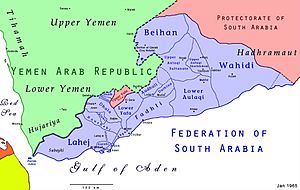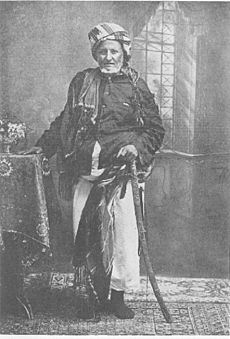Fadhli Sultanate facts for kids
Quick facts for kids Fadhli Sultanate
السلطنة الفضلية
|
|||||||
|---|---|---|---|---|---|---|---|
| State of the Federation of South Arabia | |||||||
| 17th century–1967 | |||||||
|
Flag |
|||||||
 Map of the Federation of South Arabia |
|||||||
| Capital | Shuqrah, then Zinjibar | ||||||
| Area | |||||||
| • Coordinates | 13°25′N 45°40′E / 13.417°N 45.667°E | ||||||
| Population | |||||||
|
• 1931
|
24,000 | ||||||
| • Type | Monarchy | ||||||
| History | |||||||
|
• Documented since
|
17th century | ||||||
|
• Disestablished
|
1967 | ||||||
|
|||||||
The Fadhli Sultanate (also known as Fadhli) was an independent state ruled by a sultan (a type of ruler) on the southern coast of the Arabian Peninsula. It existed from the 1600s until 1967. People at the time, especially the British, thought the Fadhli people were strong and brave.
Contents
Where Was the Fadhli Sultanate?
The Fadhli lands were located northeast of Aden, a major port city. Their territory stretched for about 160 kilometers (100 miles) along the coast. It went from the area near Imad in the west to Maqatin in the east.
A Look at Fadhli History
Early Agreements with Britain
After the British took control of Aden in 1839, they made an agreement with the Fadhli Sultanate. The Fadhli Sultanate was one of the first "Nine Cantons" to sign protection agreements with Great Britain in the early 1900s. This meant they became part of the British Aden Protectorate. A protectorate is a country that is controlled and protected by a stronger country.
The Sultan of Lahej, a nearby state, used to pay money every year to neighboring tribes, including the Fadhli. This was because trade routes passed through their land. The British continued these payments, hoping the Fadhli leaders would remain friendly.
Challenges and Changes
However, the Sultan of Lahej, Ali bin Muhsin, was not a strong leader. He could not stop crimes committed by neighboring tribes against British officers. The Fadhli tribe even protected some people who had committed these acts. Because of this, the British stopped paying the Fadhli Chief.
To get his payments back, the Fadhli Chief had to remove the criminals he was protecting. He did this and then signed an agreement to protect goods traveling through his land from Aden. Since the Sultan of Lahej couldn't keep order, the British decided to deal directly with the tribal chiefs instead of through him.
Sultan Ahmed bin Abdulla's Rule
For some years, Sultan Ahmed bin Abdulla of Fadhli behaved well. He even helped when a ship called the Staelie was wrecked in 1864. The British government praised him for his help.
But soon after, he became unfriendly again. This might have been because he felt he didn't get enough reward for his help. He also might have been jealous of the British's close relationship with the Sultan of Lahej. He attacked a trade caravan near Aden and gathered a large force.
In December 1865, the British sent troops against him. He was defeated, and the troops entered Fadhli land, destroying several villages. The seaport of Shuqrah was spared at first. But when the Fadhli committed more acts of hostility, another British force was sent. They destroyed forts inland, showing the Fadhli that they could be reached by land or sea.
Peace Treaty and Later Events
The British demanded that the Sultan or his son come to Aden and surrender completely. In March 1867, the Sultan agreed to send his elder son. A treaty was signed in 1867, and the British agreed to forget past problems.
As part of the treaty, a relative of the Sultan was supposed to live in Aden as a permanent hostage. This rule was later stopped. The Fadhli Sultan's monthly payment was increased. Sultan Ahmed bin Abdulla died in 1870. His son, Haidara, became Sultan but was killed in 1877. His brother, Husein, was suspected of the murder and was removed by the tribe. Ahmed, Husein's son, was then chosen as Chief.
In 1872, the Fadhli tribe agreed to stop charging taxes on goods passing through their land to and from Aden. Because of this, the Chief's payment was increased again. In 1877, the Fadhli Sultan was officially given a special honor: a salute of 9 guns.
Border Disputes and Protectorate Treaty
In 1881, a long-standing border dispute between the Fadhli and Abdali tribes was finally settled with a treaty. There were also conflicts with other tribes, like the Lower Aulaqi and Lower Yafai, often over land or water rights.
In August 1888, a new protectorate treaty was signed with the Fadhli. This treaty was officially approved in 1890. In 1891, the Sultan was fined and his payments stopped due to bad behavior. The British considered bringing back the rule about a Fadhli representative living in Aden. However, the punishment was later reduced when the Sultan fully submitted.
More Conflicts and Changes
Conflicts over water with the Lower Yafai continued for several years, with short breaks. The Marqashi tribe also caused trouble by stealing in British territory. The Sultan eventually took responsibility for their actions.
In 1899, at the Sultan's request, his two brothers were sent away to India for plotting against him. One brother died, and the other was later released.
Hostilities with the Yafai started again when the Sultan set up a new customs post at Zinjibar. He wanted to collect taxes on trade caravans. Efforts to make peace failed until 1904, when the Sultan visited the British Resident in Aden. He promised to stop collecting taxes and close his post at Zinjibar.
In 1906, the Sultan was reported to be collecting taxes again at Zinjibar. He claimed these were voluntary fees for escorts provided to caravans. The matter was not pursued further.
Later Sultans and the End of the Sultanate
Sultan Ahmed bin Husein died in March 1907 and was succeeded by his father, Husein bin Ahmed. During World War I, Sultan Husein was considered disloyal by the British because he signed an agreement with the Turks. His payments were stopped. After the war, he explained his actions, and his payments were restored.
In 1924, Sultan Husein died, and his grandson, Sultan Abdul Qadir, took over. A truce was made between the Fadhli and the Lower Yafai in 1926, which lasted for four years. Sultan Abdul Qadir died in 1927, and his uncle, Sultan Abdulla bin Husein, became ruler.
In 1929, the Sultan of Lahej helped settle the long-standing dispute between the Fadhli and Lower Yafai. The Fadhli Sultan was allowed to collect taxes on goods passing through his territory at a set rate.
In 1930, the Fadhli Sultanate had about 24,000 people. Its main capital was Shuqrah, on the coast. In 1962, the administrative capital moved to Zinjibar, about 60 kilometers (37 miles) east of Aden. However, the Sultan still lived in Shuqrah.
The Fadhli Sultanate was a founding member of the Federation of Arab Emirates of the South in 1959. It then joined its successor, the Federation of South Arabia, in 1963.
The last sultan, Nasser bin Abdullah bin Hussein bin Ahmed al-Fadhli, was removed from power in 1967. The Fadhli Sultanate was then abolished when the People's Republic of South Yemen was formed. This area is now part of the Republic of Yemen.
Fadhli Sultans
The Fadhli Sultanate had a long line of rulers, called Sultans. The first known Sultan was Othman, who ruled until 1670. Here is a list of the Sultans:
- Othman, ruled until 1670
- Fadhl I bin Othman, ruled 1670–1700
- Ahmed I bin Fadhl bin Othman, ruled 1700–1730
- Abdullah I bin Ahmed bin Fadhl, ruled 1730–1760
- Ahmed II bin Abdullah bin Ahmed, ruled 1760–1789
- Abdullah II, ruled 1789–1805
- Ahmed III bin Abdullah, ruled 1805–1819
- Abdullah III bin Ahmed bin Abdullah, ruled 1819–1828
- Haydara bin Ahmed bin Abdullah, ruled 1870–1877
- Hussein bin Ahmed bin Abdullah, ruled briefly in 1877
- Ahmed IV bin Hussein bin Ahmed, ruled 1877–1907 (signed treaty with British in 1888)
- Hussein bin Ahmed bin Abdullah, second reign 1907–1924
- Abdul Qadir bin Ahmed bin Hussein, ruled 1924–1927
- Abdullah IV bin Hussein, ruled 1927–1929
- Fadhl II bin Hussein, ruled 1929–1933
- Abdul Karim, ruled 1933–1936
- Saleh bin Fadhl, ruled 1936–1941
- Abdullah V bin Othman, ruled 1941-1962 (he gave up his power)
- Ahmed V bin Abdullah, ruled 1962–1964 (he gave up his power)
- Nasser bin Abdullah bin Hussein bin Ahmed, ruled 1964–1967 (the last sultan)
 | Aaron Henry |
 | T. R. M. Howard |
 | Jesse Jackson |



